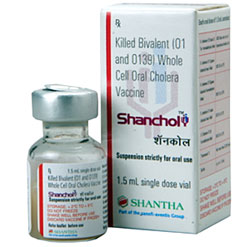 |
Almost the only group that drug companies target for a cholera vaccine is travellers from developed countries to underdeveloped ones. Ironically thousands of people in India, Nepal, Pakistan, and Bangladesh suffer from cholera, but the vaccine is not available to them.
Cost is certainly one factor inhibiting its widespread use. The vaccine Dukoral is manufactured in Sweden and costs US$40 (about Rs 3,000) a pop.
But there is good news. The pharmaceutical powers of the world, India and China, sometimes step up to the plate when inexpensive versions of drugs or vaccines are needed. Shanta Biotechnics, an
Indian company based in Hyderbad, has begun the commercial production of the cholera vaccine. This oral vaccine is called Shanchol and was manufactured with the help of the South Korean International Vaccine Institute, as well as a grant from the Bill and Melinda Gates Foundation. Costs have been slashed to US$6 (Rs 400 to 500) and may be cut further.
The oral vaccine consists of killed pathogenic strains 01 and 0139 of vibrio cholera, the bacteria that causes the disease. It is administered in two doses, one week apart in adults, and three weeks apart in children. A trial in Kolkata that enrolled 70,000 people showed that the vaccine was 67 per cent effective.
Just having the vaccine commercially available does not mean it will be used, however. Take the typhoid vaccine. It has been available for decades and WHO strongly recommends its use in vulnerable populations such as school children.
But this recommendation has been sidelined by south Asian governments even though conservative estimates indicate typhoid annually affects 22 million people and kills 300,000, mostly in South Asia.
By comparison, cholera kills about 100,000 a year. Undoubtedly, providing safe drinking water and proper sewage disposal should be emphasised to eliminate the disease, but these measures will take decades to implement. In the interim, vaccines are a clear option.
Recently, the Nepali peacekeeping force in Haiti was accused of having spread cholera there, with tragic results. This has not been proven. But a proactive measure to try to remain above suspicion is to consider the administration of the Shanchol vaccine to the next Nepali contingent going abroad.


